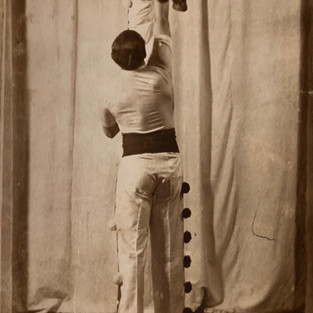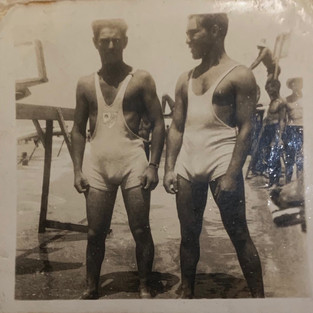The Co-founder of Krav Maga You May Not Know
- David M. Baron

- May 23, 2020
- 3 min read
Updated: Aug 13, 2021
Everyone knows the name Imi Lichtenfeld. Why don’t we know about his childhood friend, Zalman Unreich On?
Imi Lichtenfeld, an Israeli martial artist, is known for being the founding father of Krav Maga, a self-defense system adopted by the Israel Defense Force (IDF) and several other countries. Krav Maga means "contact combat” in Hebrew. Krav Maga combines techniques from boxing, wrestling and jiu-jitsu into a fighting discipline.
Development of Krav Maga
Imi was inspired to develop Krav Maga based on his experience during his early years, with his life-long friends, David and Zalman Unreich, protecting the Jewish community against anti-Semitic riots in Bratislava, Slovakia. For more details, please read Zalman was determined not to be beaten again blog post (together protecting the community against anti-Semitism in late 1920s).

In the 1940’s, Imi fled Bratislava, heading for Israel and joining his Slovak colleagues, including Zalman who was already a respected leading member of the Haganah, part of the recruiting team. Later in Israel, as a member of the Haganah, Imi perfected the art of Krav Maga and began teaching it to his colleagues and students.
Thus, Imi is the esteemed founding father of Krav Maga. But what if he had other co-founders as well? I believe that Zalman, his brother David, and the rest of the Unreich family deserve some credit for their contributions to the development of Krav Maga. Of all the Unreich brothers, Zalman by far was the most versatile and an excellent multi-sport athlete, which included professional gymnastics (with Imi's father's circus) and swimming.
A Multi-Sport Athlete
Enclosed below are links to Zalman’s reflections on wrestling, which make interesting reading, especially if you read German or Czech.
“Wrestling, boxing or Jiu-jitsu like sports is not just a game; an athlete has duties and rights towards his opponent and to the community."
Zalman's Unpublished Wrestling Manuscripts
For example, he treated it as far more than a sport, almost as a philosophy, below are excerpts:
“Wrestling is the best medium to strengthen and heal the body."
"Abstinence from alcoholic and sexual indulgence is essential, in order to attain the highest degree of mental and physical strength. One’s opponent is not a machine but an intelligent being; to win demands quick decision-making. The art of self-defense trains both the body and the mind. Wrestling is not just a physical activity; it is a test of will, an uninterrupted, intense mental activity, testing the opponent, unfolding and exchanging physical and mental capacities."
"The more that a sport challenges our sharpness, the more it captures our entire person. It enables us to have mastery over our feelings, so that they will accomplish anything we demand from them."
While these manuscripts touch on Zalman's self-defense philosophy, his soon to be published new transliterated writings, contain some surprising descriptions of (1) who can and how to perform the martial arts of jiu-jitsu; and (2) his opinion on forbidden grip techniques that are illegal in professional wrestling matches.
Before Imi arrived in Palestine in the 1940s, Zalman by this time was acknowledged as a master trainer in the Jewish wrestling/boxing community, known both for his expertise in the ring and his skill in training young Jewish fighters. In Israel, Zalman’s training club acted as a magnet for some of the leading athletes in the country - training the future Israeli army.

Zalman trained both men and women who demonstrated ambition and commitment. Training with them, he felt himself growing fitter and stronger than ever. In 1935, when the second International Maccabi games were held in Tel Aviv, Zalman was entered in the Heavyweight class and he won the gold medal. Unfortunately, Imi couldn't participate because of an injury.
Leading & Training the Future Israeli Army
Perhaps during a more tranquil times Zalman may have managed to construct a one dimensional lifetime career in the military for himself. Maybe even focusing solely on sports, as a fighter, trainer, referee and possibly even one day as a pundit or manager. But Zalman didn’t live in such times and Israel's leadership needed his talents elsewhere, much as he enjoyed wrestling, he knew he had to subdue his passion in favor of more pressing matters.
Zalman's Boxing and Wrestling Sports Advertising Ephemera
For the latest information please visit: https://www.kravmagafounders.com/post/krav-maga-legends-from-bratislava




































Comments